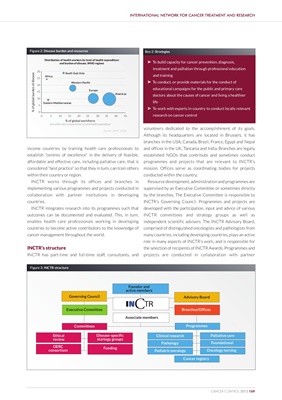
INTERNATIONAL NETWORK FOR CANCER TREATMENT AND RESEARCH
Figure 2: Disease burden and resources Box 2: Strategies
Distribution of health workers by level of health expenditure
and burden of disease, WHO regions ‰ To build capacity for cancer prevention, diagnosis,
treatment and palliation through professional education
30
South-East Asia
% of global burden of disease
Africa and training
25
Western Pacific ‰ To conduct, or provide materials for the conduct of
20
Europe educational campaigns for the public and primary care
15
Americas
doctors about the causes of cancer and living a healthier
10
Eastern Mediterranean life
5
‰ To work with experts in-country to conduct locally relevant
0
0 5 10 15 20 25 30 35 40 45 research on cancer control
% of global workforce
Size of the dots is proportional to total health expenditure
(Source: WHO, 2006)
volunteers dedicated to the accomplishment of its goals.
Although its headquarters are located in Brussels, it has
branches in the USA, Canada, Brazil, France, Egypt and Nepal
income countries by training health care professionals to and offices in the UK, Tanzania and India. Branches are legally
establish “centres of excellence” in the delivery of feasible, established NGOs that contribute and sometimes conduct
affordable and effective care, including palliative care, that is programmes and projects that are relevant to INCTR’s
considered “best practice” so that they in turn, can train others mission. Offices serve as coordinating bodies for projects
within their country or region. conducted within the country.
INCTR works through its offices and branches in Resource development, administration and programmes are
implementing various programmes and projects conducted in supervised by an Executive Committee or sometimes directly
collaboration with partner institutions in developing by the branches. The Executive Committee is responsible to
countries. INCTR’s Governing Council. Programmes and projects are
INCTR integrates research into its programmes such that developed with the participation, input and advice of various
outcomes can be documented and evaluated. This, in turn, INCTR committees and strategy groups as well as
enables health care professionals working in developing independent scientific advisers. The INCTR Advisory Board,
countries to become active contributors to the knowledge of comprised of distinguished oncologists and pathologists from
cancer management throughout the world. many countries, including developing countries, plays an active
role in many aspects of INCTR’s work, and is responsible for
INCTR’s structure the selection of recipients of INCTR Awards. Programmes and
INCTR has part-time and full-time staff, consultants, and projects are conducted in collaboration with partner
Figure 3: INCTR structure
Founder and
active members
Governing Council Advisory Board
Executive Committee Branches/Offices
Associate members
Committees Programmes
Ethical Disease-specific Clinical research Palliative care
review startegy groups
Pathology Foundational
OERC Funding
consortium Pediatric oncology Oncology nursing
Cancer registry
CANCER CONTROL 2013 169